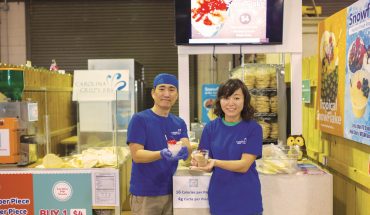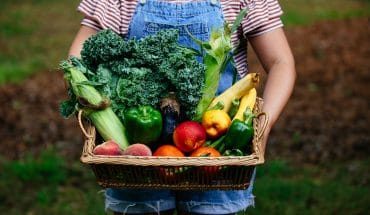Demetrius Hunter is a man who does not sit still. His day begins early in the morning, when he meets deliverymen to help unload fresh fruits and vegetables for the day’s grocery orders. He meticulously fills each crate with local produce: blueberries, assorted potatoes, onions, squashes and bunches of collard greens that stand up like church fans. After he loads up the truck, he follows a familiar route to the southeast corner of Raleigh’s urban core.
While grocery delivery may be newly popular, Hunter’s business is 80 years in the making, a story of continuous innovation, perseverance and genuine neighborliness that connects people with quality produce.
It starts around the turn of the 20th century: Hunter’s grandmother, Mattie Sanders Hunter, inherited 10 acres in Johnston County from her formerly enslaved par- ents. As was the custom in the Depression era, she and her family—husband Lonnie and sons Zelb and Raymond— had a large plot for growing their own food. Every time the Hunters traveled to visit friends in Raleigh, they’d bring along a basket of sweet potatoes, collards or okra to share. Their conversations would always include complaints about the lack of quality of the produce options and the city slicker prices in town.
These visits ignited Zelb Hunter’s entrepreneurial spirit. He convinced his brother that they could become truck farmers, an early twentieth-century business practice of farmers driving to sell produce directly to customers. But the Hunter family couldn’t afford to use their aging pickup. Gas prices were at an all-time high, so they cut off the bed of the truck and attached it to the family mule. Then they filled the makeshift cart with produce from the garden to sell to city-dwelling friends and their neighbors who longed for a taste of the country. The goal was to raise enough money to replace and upgrade aging work equipment—including buying a proper cart—but a seed of possibility was also planted in Zelb Hunter’s heart.
World War II came along, and Zelb Hunter served three tours. Upon his return, he married Penny Powell, and they started their lives and family together, first as sharecroppers, then as employees of Dorothea Dix Hospital. They owned a home nearby, but held on to a hog farm near Garner, which was kept up by the older children until they sold the last hog in the mid-1980s. Soon, Zelb Hunter began to work with other farmers and grocers in Wake and Johnston Counties to sell fresh, local fruits and vegetables, along with his homemade link sausages and country hams, to the residents of Southeast Raleigh. What started in the 1950s as a side hustle became a full-service grocery delivery business by the time he retired from Dix Hospital in 1980.
By this time, his son Demetrius, the youngest of their 10 children, became his father’s right-hand man. “The time together doing deliveries was my bonding time with him,” says Demetrius Hunter. “It was where my father taught me how to treat people and how to be humble.” Customers and farmers would affectionately call him “Little Zelb” when they saw the young man unloading crates of collard greens from grocers’ delivery trucks and helping the elderly customers with their shopping bags. And it turned their father-son relationship into a true friendship.
Through the 1980s and 1990s, folks would fetch their wallets, purses, and baskets to purchase their groceries from “The Vegetable Man” when they heard the Hunters’ horn honking at the top of their street. People were always happy to see the father and son—and they, in turn, were delighted to see their customers. Demetrius Hunter recalls making deliveries with his father in College Park, Chavis Heights and Walnut Terrace. “These people patronized our business,” he says. “It was an economic boom for my dad. Every time he went out, his truck would be completely emptied. But that’s the way that the community supported the businesses in the area.”
But the approach of the new millennium brought changes that would have a major impact on how the Hunters could do business. As North Carolina implemented the new Electronic Benefit Transfer cards in the mid-1990s, paper food stamp vouchers became a thing of the past; they adjusted. And in 1999, a federal program called HOPE VI came to Raleigh, which demolished housing projects in Chavis Heights, Walnut Terrace, Halifax Court and College Park, in favor of a combination of low-income and market-rate dwellings. It displaced hundreds of Black and Brown families from downtown Raleigh—and replaced much of the Hunters’ customer base with wealthier, predominately white families who didn’t know who they were. “Once the neighborhoods changed over, there was hardly any business,” says Demetrius Hunter. “People didn’t come outside their houses; they knew nothing about the pick-up truck coming door to door.” A business built on generations of customer loyalty was in jeopardy.
Once again, for this small business, modernization was the key to survival. Demetrius Hunter tapped his degree in Human Resources from Cornell University and training in Organizational Management from St. Augustine University to guide the business through a sea of changes. “We shifted the business to take online orders, and became licensed meat handlers,” he says. “It was a challenge, but I’m grateful for the challenge.”
Zelb Hunter retired in 2008, and Demetrius Hunter worked to expand the operation—now under the name Grocers On Wheels—by creating the umbrella non-profit Southeast Raleigh Vicinity Emerging (SERVE) and building new relationships with up-and-coming local suppliers, as well as with public institutions.
In 2010, he found an ally in Sonya Reid, program director of the department of Wake County Human Services (WCHS). Reid petitioned for Grocers On Wheels to have a place to supply food to Wake County’s most vulnerable families—particularly in Southeast Raleigh, where the 2012 closing of two Kroger grocery stores cemented its status as a food desert. Finally, in 2017, Grocers On Wheels became the first outside vendor to sell their goods on the WCHS premises.
In recent months, Demetrius Hunter’s grocery delivery services have become a vital part of the COVID-19 relief effort. Grocers on Wheels is the supplier for a food distribution program for residents in need built by Fertile Ground Co-Op Grocery Store and Southeast Raleigh Table, an affiliated faith community of Edenton Street United Methodist Church. Grocers On Wheels is also participating in a program designed by the Carolina Farm Stewardship Association called FarmSHARE (Farms Serving Hospitality and Restaurant Employees). Every week, they distribute a thousand crates of food—called Horn of Plenty boxes—from locally-owned, sustainable farms to restaurant and service workers in need across the Triangle, using restaurants as pick-up sites. Demetrius Hunter also recently secured funding from United Way to deliver produce boxes to rural areas in eastern Wake, Johnston and Orange counties—communities often under-assisted by charitable organizations that serve cities.
As neighborhoods and needs have changed, Demetrius Hunter has adapted to new demands with grace and proficiency. And while the name and technology have changed, at its heart, Grocers on Wheels continues to build on his father’s legacy of providing healthy, fresh produce to his community—and the emphasis on relationship- building, generosity and excellent customer service is the same as it was decades ago. “The lessons I learned from my father, and the stories he shared with me about our family history, are so valuable to me,” says Demetrius Hunter. “He gave me my life’s work: feeding and uplifting my community.”






